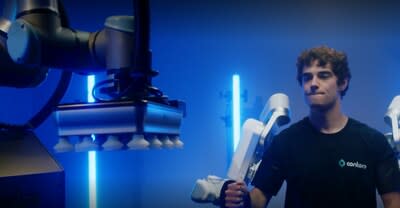Robotics and AI in Schools
Could robotics and AI (artificial intelligence) be the combination students need for a tech-centric future? As the world enters a future deeply entwined with AI, it’s more crucial than ever that future generations are raised to be creators, not just consumers. While introducing AI and STEM concepts might seem overwhelming for youngsters, some experts say early engagement is important. Robots, which are already captivating to children, can serve as an introduction. Robotics and AI in Schools.
Through hands-on interaction with robots, children can learn and experience the world, and engage in decision-making activities found in AI. This kind of exposure lays the groundwork for a more intuitive understanding of complex technologies that will prepare them for the future. Plus, using robots as teaching aids fits well with research showing that physical manipulatives are highly effective in teaching abstract concepts to young children. Thus, robotics and AI come together as a tool for learning certain concepts. By shifting the narrative from intimidation to exploration, the next generation is being nurtured to see AI as a tool they can shape.
Jason Innes is the Director of Curriculum, Training, and Product Management at KinderLab Robotics, Inc. With a deep-seated commitment to promoting STEM education from an early age, Innes plays a critical role in developing curricula designed to make tech subjects accessible and engaging for young children. His innovative approach leverages robots to teach fundamental concepts and empower children.
His belief is to counter potential AI reliance with tools that demand hands-on activity, such as robots. Pairing robotics and AI is a sound gateway that will positively impact the mindsets f children to be creators, added Innes.
Innes’ Thoughts on Robotics and AI
Introduction to Robotics and AI in Education
“I’m Jason Innes. I’m the Director of Curriculum and Training at Kinder Lab Robotics. Robotics is actually a great way to teach kids about artificial intelligence because robots and AI share a lot in common. They both use sensors to experience the world, they both use code to make decisions about what to do, and they both use what they gather from their sensors to actually learn and modify their own code and improve their decision making.”
Importance of Early STEM Education
“When introducing STEM concepts in school, we know that it’s important to start young. STEM, computer science, all of that needs to start as early as possible because we want to encourage children to think of themselves as creators with technology, and technology surrounds all of the kids, even young kids. So, the earlier we can start, the better chance we have of promoting a positive attitude towards STEM for young children. So, that’s one of the reasons computer science standards start as early as kindergarten, and the same goes for teaching artificial intelligence.”
Role of AI in Future Education
“We know that AI is going to be a big part of the educational world going forward. It’ll be a big part of how we teach, how children learn, but what’s most important in early childhood is to build an understanding of how these tools work because we want children, again, to see themselves as creators with these tools, not just consumers.”
Teaching Strategies for Abstract Concepts
“So how can we do that? How can early childhood educators teach young kids about something as abstract as artificial intelligence? Well, at Kinder Lab, we promote STEM education through our screen-free Kibo robot kit. Robotics is actually a great way to teach kids about artificial intelligence because robots and AI share a lot in common. They both use sensors to experience the world, they both use code to make decisions about what to do, and they both use what they gather from their sensors to actually learn and modify their own code and improve their decision making.
So we can use robots to approach these concepts, and they’re especially useful in early childhood because robots are concrete objects, physical manipulatives that children can use to engage with these abstract concepts. We know that physical manipulatives are the best way to teach, in general, abstract concepts in early childhood, and the research shows that that applies to computer science and to artificial intelligence as well.”
Practical Classroom Applications
“So what does it look like in the classroom to teach about AI with a robot? Well, at Kinder Lab, we’ve released a new free curriculum called Thinking with Kibo that includes a bunch of different lesson plans exploring these ideas. In one of them, we ask children to create their own Mars rover. So they’ll take the robot that they’re using in the classroom and they imagine that it’s exploring another planet.
We get the children to think about what sensors their robot may need to explore that world, maybe a light sensor to find a safe area to explore, a distance sensor to sense obstacles or samples to gather. We get the children to think about how the robot will use that information from their sensors in the code to make decisions about what to do, and even how the robot might improve its information gathering based on its experiences exploring that planet.”
Encouraging the Role of Children as Designers
“Getting children to reflect on the differences between the simple robots that they can program and the more advanced AI systems allow children to engage with kind of the limitations of these systems and think of themselves as designers and creators. We want children to understand that artificial intelligence, is a tool created by human engineers, just like them. That’s the most important lesson that young children need to learn about AI.”
Source: Robotics and AI in Schools
https://marketscale.com/industries/education-technology/combining-robotics-and-ai-in-schools-is-sufficient-introduction-to-prepare-students-for-tech-centric-future/

